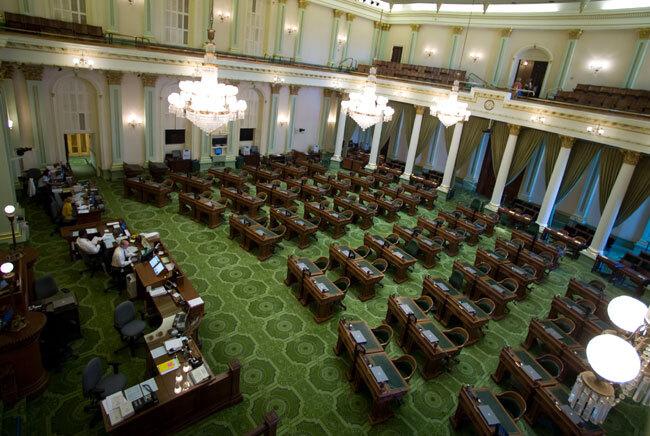In the first two months of 2024, California lawmakers have introduced new noteworthy criminal justice bills and reintroduced bills that failed to make it to the governor’s desk in 2023.
Below, we’ve gathered some of the bills readers may want to have on their radar this legislative season.
Bills meant to prevent mass shootings
The first bill, by Senator Nancy Skinner (D-Berkeley), would strengthen the state’s gun violence restraining order (GVRO) law — also known as the red flag law.
Sen. Skinner authored the original law, which was passed in 2014, in response to the mass shooting in Isla Vista. The current version of the law allows immediate family members, employers, law enforcement agencies, and others to request that a judge order guns to be temporarily removed from individuals suspected of being a danger to themselves and others.
Skinner’s SB 899 would strengthen the ability of courts and law enforcement to ensure that individuals at risk of harming themselves or others don’t have access to firearms.
“A decade ago, I authored AB 1014, the country’s first ‘Red Flag’ law, designed to keep firearms out of the hands of those threatening violence to themselves or others. California has also enacted laws to help victims of domestic violence, schools and workplaces get guns away from those threatening harm,” Skinner said. “But too many people don’t turn over their guns as ordered. By giving our courts and law enforcement tools to ensure that guns are surrendered, SB 899 will make our gun violence prevention laws work as intended.”
Another bill, AB 2470, by Assemblymember Joe Patterson (R-Rocklin), would categorize felony domestic violence as a violent crime in the state’s penal code.
While this may sound confusing, felony domestic violence is not currently included in the penal code’s list of violent felonies — murder, attempted murder, mayhem, rape, robbery, kidnapping, etc. — currently eligible for additional prison time via sentence enhancements and the Three Strikes Law.
When announcing the bill, Asm. Patterson pointed out that more than 68% of people who become mass shooters, had a history of domestic violence or had killed a family member.
“Statistics show that violent domestic abusers are the individuals most likely to commit mass shootings,” said Asm. Patterson. “If we hold them accountable, we will reduce mass shootings.”
Legalizing medical psychedelics
Last year, California Governor Gavin Newsom vetoed a bipartisan bill to decriminalize the possession of mescaline, dimethyltryptamine (DMT), and psilocybin (mushrooms).
In his veto message, Newsom acknowledged the potential therapeutic benefits of psychedelics for treating PTSD, traumatic brain injuries, and other conditions, but indicated the bill was underdeveloped.
The governor wrote that he was “committed to working with the legislature and sponsors of this bill to craft legislation that would authorize permissible uses and consider a framework for potential broader decriminalization in the future, once the impacts, dosing, best practice, and safety guardrails are thoroughly contemplated and put in place.”
This year, the original bill authors, Senator Scott Wiener (D-San Francisco) and Assemblymember Marie Waldron (R-Valley Center), are back with a bill that would legalize the use of those plant-based hallucinogenics in certain medical settings, and build a system to regulate the cultivation and sale of such psychedelics. The bill, SB 1012, would allow “adults 21 and older to use certain psychedelic substances in a therapeutic context, in a safe and controlled environment, and under the supervision of a licensed and trained facilitator.”
Another bill by Sen. Wiener, SB 912, would restrict law enforcement officers from using the results of color-based (colorimetric) drug tests — which are used to determine whether a substance contains any illegal compounds, but are often inaccurate — as a basis for arresting and charging individuals without verifying the results using more accurate tests.
Wiener introduced the bill in response to research revealing that use of these false-positive-prone color-based tests appears to be the largest known factor contributing to wrongful arrests and convictions.
In their report, researchers at the Quattrone Center for the Fair Administration of Justice at the University of Pennsylvania Carey Law School found that approximately “30,000 people who do not possess controlled substances are falsely implicated by these tests and arrested each year.” And more than half of the 1.5 million drug arrests carried out annually in the US involved the use of colorimetric tests.
Doubling punishment for protesters
In response to protests during which participants blocked freeways — a common form of protest most recently employed in San Francisco and Los Angeles, by people calling for a permanent ceasefire in Gaza — Assemblymember Kate Sanchez (R-Rancho Santa Margarita) introduced a bill to double penalties for individuals who purposefully block traffic on freeways.
The bill, AB 2742, will create a new crime: obstructing a freeway in a manner that blocks emergency vehicles from getting through.
Under AB 2742, using vehicles to block traffic would carry a fine between $100-$250 for first-time offenses, $150-$500 for second offenses, and $250-500 for a third time. Individuals blocking traffic with their bodies would face fines of $200-$500 the first time, $300-1,000 the second time, and $500-$1000 the third instance.


You want to curb destructive behavior such as blocking roadways, thoroughfares and purposely holding of traffic that violates other’s people’s right to use access roads to travel… then stop wit the bandaid fines and immediately institute wage garnishment if a person is employed along with a mandatory jail time of 1 month. That will keep these a—- holes off the streets. You want to have a peaceful protest, stay your ass on the side walks and obey the traffic lights.